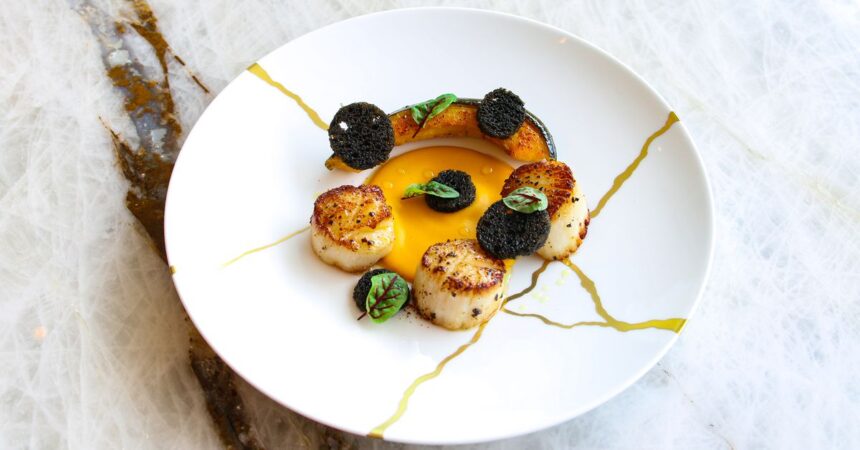Credited for its immense cuisine diversity, Houston has long been lauded by chefs, locals, and travelers as one of the best dining destinations in the world. The city’s list of James Beard Award winners and nominees, chefs with Michelin-starred-restaurant experience, and restaurants that have Michelin stars in other places (think Le Jardinier and Tim Ho Wan) have only added to its hometown pride. But recent news that the Michelin Guide has officially, finally, landed in Texas gives it an added boost — particularly after a devastating tropical storm that left much of Houston powerless.
Of course, now that Michelin is here, Houstonians have started to wonder: What exactly does the guide mean for the city?
Felipe Riccio, the chef behind Goodnight Hospitality establishments, including tasting menu restaurant March and the recently opened Marigold Club, says that it’s exciting for Houston restaurants to get recognition on an international level. “I think everyone that operates and runs a restaurant here is a champion of the city. We believe in the dining scene in our city,” Riccio tells Eater.
Bringing the guide to Texas’s five major cities was a smart move, he says, but accurately assessing Houston, the fourth largest and most diverse city in the country, may be a challenge for the anonymous Michelin Guide inspectors. The three years Michelin has committed to Texas is likely not enough, Riccio adds, but he says he’s confident that inspectors will be pleased with what they find. “It’s going to take time to unearth gems in the city. I’ve lived in Houston the majority of the past 18 years, and I’m still discovering parts of it and restaurants that blow my mind,” Riccio says. Considering this, Riccio says locals can expect some “misses” in how the guide rates Houston’s dining scene. What will count, he says, is if Michelin looks at the city in its entirety.
Some local chefs and restaurateurs predict the guide will add pressure to restaurant teams, pushing them to approach their menus in different ways. Felipe Botero Sanchez, the chef behind Le Jardinier, which has Michelin-starred locations in Miami and New York, says the Michelin Guide will usher in a new era for Texas’s dining scene. “It’s going to be the Olympics of Texas cooking, with all eyes on Texas,” says Sanchez, who encourages chefs to use it as momentum to pursue and offer top-tier food and service to local and traveling diners. “There’s no going back now,” Sanchez says. “We should embrace it and make something out of it, and make changes for the best.”
Still, other chefs in the community say Michelin could make things tricky. Aaron Bludorn, the Beard-nominated chef behind Houston restaurants Bludorn, Navy Blue, and Bar Bludorn, says he originally wasn’t enthusiastic about the idea of Michelin coming to Houston because of its potential to stifle creativity. “I think I had PTSD from having to deal with the guide so many times at Cafe Boulud and what that entails,” says Bludorn, who worked with Daniel Boulud at his restaurant for a decade. “I just kind of felt like I was so happy to get out of the routine of being terrified to lose a star, and are we doing the right thing? That ended up being the number one goal — to retain our stars. When that’s your mentality, you’re not cooking for the guests.”
When he came to Houston in 2019, Bludorn says he was excited to focus solely on the diners’ experience of his food at Bludorn, which opened in 2020. “It just felt like anything’s possible. You can do anything you want as long as the guest is happy,” he says. “The biggest reward for me is having regulars at the restaurant. … I’d rather cook for our [regulars] than one inspector once a year.”
James Beard Award-winning chef Chris Shepherd admits he has “no skin in the game” since retiring from owning local restaurants in 2022, but says he’s had some concerns, too. “I don’t want people cooking for stars and to stop cooking from their heart,” he says. Shepherd, who has long been an advocate for the Houston food scene, says he’s skeptical about Michelin’s entry to the city, considering that Travel Texas, the state’s tourism arm, paid the tire company an undisclosed amount of money to rate restaurants. Shepherd says he also finds the Michelin criteria, which indicates its star ratings are based solely on food — not service or design — confusing since all aspects serve as a major part of the diner’s experience. “There’s so many questions,” he says.
Shepherd says that the Bib Gourmands and one to two-star recognitions can be helpful to restaurants, but once recognition ventures into three-star territory, things get hectic. “There’s already enough pressure of keeping the restaurant busy and taking care of staff, and then you get one of those things. What happens if you lose them? It’s devastating,” he says.
Others worry that the star-rating system could impose an over-competitiveness in Houston’s restaurant scene — a community that is typically collaborative and supportive, Graham says. “We’ve all got our lists of other restaurants — either written down or verbal — to tell our guests. As long as that spirit stays, then, it’s great,” Graham says. “If anybody gets stars in Houston, we all win.”
Bludorn and Shepherd both acknowledge that many restaurants will benefit greatly from Michelin being in Texas. “It will bring a spotlight on the amazing dining scene in Houston, bolster it, and bring more talent and excitement,” Bludorn says. “I think it’s great overall.” Riccio says his team’s decision-making will remain motivated by their internal goals, not Michelin metrics. “We want to do a good job for our team and for our guests who spend time and money for us. That’s what drives the team here,” he says. “I don’t think [Michelin] changes how we do things. It only reinforces it to the highest standard. We do it because we love it.”
And every restaurant is only good as its last meal, Graham adds. “No award is going to make up for that,” he says. “Houston should shoot for the stars. Houston deserves it. We deserve it.”











